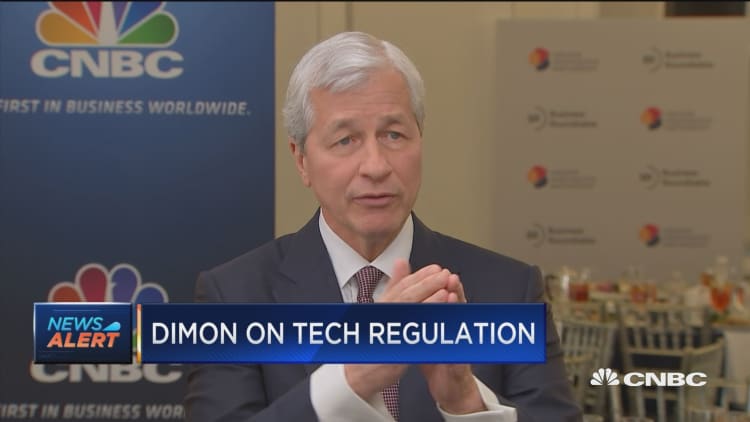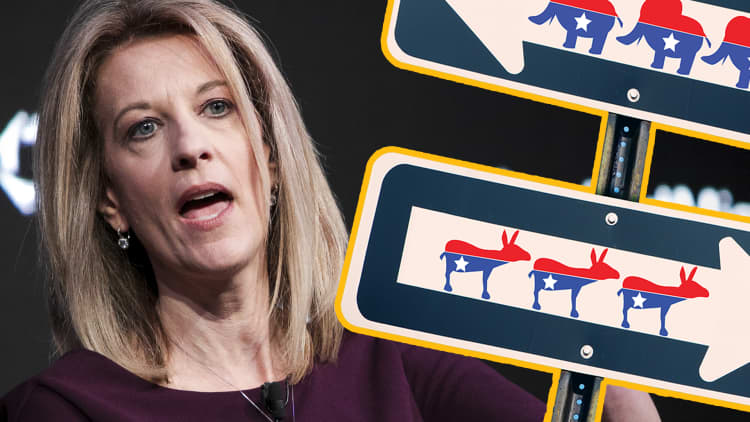President Donald Trump is happy to boast that he slashes more regulations than any president who preceded him. He literally cut red tape in the White House in December 2017 while standing before stacks of paper representing rules.
The president may want to tread carefully on the issue as the 2020 election nears. Democratic candidates aim to turn Trump's rhetoric about regulation against him as they try to deny him a second term next year.
Trump campaigned on chopping regulations, arguing fewer rules would boost businesses and the economy. He has made some significant changes — rolling back Obama administration efforts to limit emissions from coal-burning power plants and automobiles, among other steps. The president also backed a law to scrap some bank rules passed after the 2008 financial crisis. While bank stocks took a beating in December along with the broader market, the Financial Select Sector SPDR ETF — which counts the largest U.S. banks among its top holdings — has climbed nearly 10 percent since Trump took office.
The deregulation message features prominently in his re-election rhetoric. In his State of the Union address last month, Trump claimed his administration "has cut more regulations in a short period of time than any other administration during its entire tenure."
The president has actually done more to slow the pace of new regulations, or ease enforcement of current rules, than cut them entirely, according to several experts who track regulation. But that has not stopped both Republicans and Democrats from acting like he has taken more drastic steps to slash government rules.
Whether to put new limits on companies could become a point of conflict in the 2020 election. Lacking signature achievements beyond the GOP tax law, Trump wants to attribute a strong economy — his best selling point — in part to his push to cut regulations on businesses. At the same time, Trump's rhetoric could boost one of Democrats' main arguments: that the president has crafted his policy to help big business rather than consumers and the working class.
"Inflating what he's done on the regulatory front is to his advantage," said Cary Coglianese, a professor at the University of Pennsylvania Law School and director of its regulation program. "But on the other hand, progressives will embrace that narrative too, to paint Republicans as being in the pocket of big business, of contributing to a system that's rigged in favor of the big banks, big insurance companies, big pharmaceutical companies."
The argument becomes harder for Democrats to make if the economy and job market remain strong as November 2020 nears. A recent pickup in U.S. wage growth — which had previously lagged despite solid job creation — could only help Trump's re-election case.
Democrats take shots at deregulation
How a Democratic victory in 2020 would affect the regulatory environment depends on who becomes the party's presidential nominee. It also hinges on whether Democrats and Republicans keep control of the House and Senate, respectively.
But experts believe a Democratic president would seek to reverse Trump's deregulatory actions or tighten rules in at least three areas: the environment, the financial industry and the technology sector. A second Trump term would give his administration more time to reverse old rules or implement its own, which can take years to do.
Democratic presidential contenders have been setting up their attacks on Trump's policies since he took office in January 2017. In a speech last year, Sen. Elizabeth Warren, D-Mass., argued that "President Trump and his team have embarked on an aggressive effort to kill the rules that protect the American people from corporate predators." Candidates such as Sen. Bernie Sanders, I-Vt., and Sen. Cory Booker, D-N.J., have used committee hearings to give dire warnings about the administration's environmental regulation rollbacks.
The race is in its early stages, and only a few candidates have started to put forward specific policy proposals. Regardless, initial signs show a Democratic field hoping to win in part by pledging to reverse some of Trump's actions and take their own steps to keep companies in check.
Various candidates in the crowded Democratic field have pledged to quickly reinstate the regulations on coal and car emissions that Trump scaled back. Simply reversing the previous White House's actions — as Trump has done with several Obama policies — would be "the first and easiest" step for a potential Democratic successor to take, said Elaine Kamarck, a fellow in governance studies at the Brookings Institution and former Clinton White House official.
Democrats led by Warren have called to empower the Consumer Financial Protection Bureau, the watchdog and brainchild of the Massachusetts senator that the Trump administration has mostly defanged. Warren and Sen. Amy Klobuchar, D-Minn., among others, have called for new rules to make companies that handle sensitive consumer data more accountable to consumers. They have focused mostly on Equifax, the credit reporting agency that lost data on 140 million people in a cyberattack.
Sanders has also called for putting certain conditions on companies before they buy back their own shares.

Calls by Democrats to put a tighter leash on social media companies have also grown more widespread. Klobuchar has pushed for rules to require companies such as Facebook and Twitter to share more information about who buys political ads and which third-party companies receive user data. Warren also made waves by calling to break up major technology companies including Facebook, Google and Apple.
The push for tough regulation is mainstream enough that J.P. Morgan Chase CEO Jamie Dimon — whose own industry could face more scrutiny in a Democratic administration — is taking notice.
"They haven't had the benefit of the full monty yet," he told CNBC, in reference to tech companies facing a wave of new rules. He added that "if I were them, I'd be getting prepared for it."
How much a Democratic president could accomplish remains to be seen. If Republicans hold the Senate, a Democratic White House occupant may have to act mostly through executive agencies, which would limit what they could do and open them up to more legal challenges.
Trump gears up to boast about deregulation
Trump's State of the Union address previewed many of his 2020 election messages. For instance, he has repeatedly argued Democrats want to embrace socialism after proclaiming during the speech that "America will never be a socialist country."
Expect Trump to return to his bold claims about how much he has done for business by cutting regulation, especially if Democrats continue to call for tighter rules on companies. In a statement, Trump campaign spokeswoman Kayleigh McEnany said: "President Trump's deregulation has spurred job growth and raised paychecks across the country, unleashed entrepreneurship and saved billions of taxpayer dollars."

Trump has dramatically reduced the pace of new rules, although it is unclear whether he has actually cut more regulations than his predecessors. The pace of federal restrictions climbed by 0.73 percent during the president's first 15 months in the White House, according to a FactCheck.org assessment citing data from George Mason University's Mercatus Center. By December, only about 325 more restrictive rules were on the books than when Trump took office, the report said. For comparison, the same type of rules increased by about 1.5 percent annually during both the Obama and George W. Bush administrations.
It is not clear whether Trump's regulatory changes actually improved the economy, either. Average monthly job creation has not noticeably improved since the Obama administration, while gross domestic product growth has.
Trump certainly thinks touting his deregulatory efforts makes a good political case. For years, politicians have promoted efforts to make it easier for businesses to operate and create jobs.
But public opinion may go against him — especially in an era when attacks on big business and the wealthy have proven potent.
As Trump prepared to enter office in January 2017, 51 percent of voters said he should not remove regulations on businesses and corporations, while 39 percent responded that he should, according to a Quinnipiac University poll. In addition, 59 percent of respondents said he should not remove specific regulations intended to combat climate change versus 32 percent who thought he should.
Voters answered differently depending on their parties. While the vast majority of Democrats and most independents said they favored keeping regulations in place, Republicans by a wide margin said they wanted the president to get rid of rules.
The politics around regulation can change in an instant if voters see a practical effect from lax rules. For instance, Boeing has faced more scrutiny over the certification process for its 737 Max jets following two deadly crashes since October.
Rumblings for more scrutiny of Boeing have already started within the Democratic field. On Wednesday, Klobuchar called for a congressional "oversight investigation on what happened" with the company's jets.
So far, Trump has faced less political backlash than he might have if the crashes took place in the United States, said Stan Veuger, a resident scholar at the American Enterprise Institute, a conservative-leaning think tank. If more problems with the 737 Max emerge — or the issues become more directly tied to Trump administration policy — Trump could start to face more political pressure over it.
"I think for there to be real political risk, you need to have a serious incident," Veuger said.


